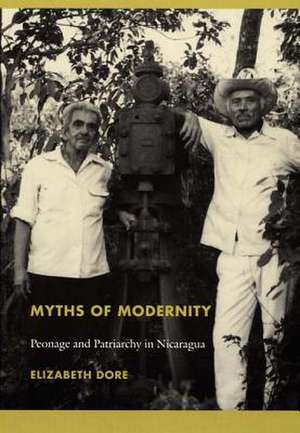Myths of Modernity – Peonage and Patriarchy in Nicaragua
Autor Elizabeth Doreen Limba Engleză Paperback – 24 ian 2006
Preț: 261.38 lei
Nou
Puncte Express: 392
Preț estimativ în valută:
50.01€ • 52.37$ • 41.48£
50.01€ • 52.37$ • 41.48£
Carte tipărită la comandă
Livrare economică 10-24 aprilie
Preluare comenzi: 021 569.72.76
Specificații
ISBN-13: 9780822336747
ISBN-10: 082233674X
Pagini: 272
Ilustrații: 17 illustrations
Dimensiuni: 156 x 228 x 19 mm
Greutate: 0.39 kg
Editura: MD – Duke University Press
Locul publicării:United States
ISBN-10: 082233674X
Pagini: 272
Ilustrații: 17 illustrations
Dimensiuni: 156 x 228 x 19 mm
Greutate: 0.39 kg
Editura: MD – Duke University Press
Locul publicării:United States
Recenzii
As ideal a combination of fine-grained, historically rich ethnography; astute political economy; and powerful feminist scholarship as one could possibly hope for. A standard to emulate. James C. Scott, Yale University
In this uniquely researched study, constructed in dialogue with generations of members of the Diriomo community, written records, scholarly debates, and revolutionary policymakers, Elizabeth Dore shows why debt peonage and land privatization in the Nicaraguan coffee boom failed to generate capitalism. Gender is an important element in her argument and one that economic and social historians can no longer afford to ignore. Mary Kay Vaughan, coeditor of The Eagle and the Virgin: Nation and Cultural Revolution in Mexico, 19201940
"As ideal a combination of fine-grained, historically rich ethnography; astute political economy; and powerful feminist scholarship as one could possibly hope for. A standard to emulate." James C. Scott, Yale University "In this uniquely researched study, constructed in dialogue with generations of members of the Diriomo community, written records, scholarly debates, and revolutionary policymakers, Elizabeth Dore shows why debt peonage and land privatization in the Nicaraguan coffee boom failed to generate capitalism. Gender is an important element in her argument and one that economic and social historians can no longer afford to ignore." Mary Kay Vaughan, coeditor of The Eagle and the Virgin: Nation and Cultural Revolution in Mexico, 1920-1940
In this uniquely researched study, constructed in dialogue with generations of members of the Diriomo community, written records, scholarly debates, and revolutionary policymakers, Elizabeth Dore shows why debt peonage and land privatization in the Nicaraguan coffee boom failed to generate capitalism. Gender is an important element in her argument and one that economic and social historians can no longer afford to ignore. Mary Kay Vaughan, coeditor of The Eagle and the Virgin: Nation and Cultural Revolution in Mexico, 19201940
"As ideal a combination of fine-grained, historically rich ethnography; astute political economy; and powerful feminist scholarship as one could possibly hope for. A standard to emulate." James C. Scott, Yale University "In this uniquely researched study, constructed in dialogue with generations of members of the Diriomo community, written records, scholarly debates, and revolutionary policymakers, Elizabeth Dore shows why debt peonage and land privatization in the Nicaraguan coffee boom failed to generate capitalism. Gender is an important element in her argument and one that economic and social historians can no longer afford to ignore." Mary Kay Vaughan, coeditor of The Eagle and the Virgin: Nation and Cultural Revolution in Mexico, 1920-1940
Notă biografică
Elizabeth Dore
Textul de pe ultima copertă
""Myths of Modernity" demonstrates why an understanding of history is important to current policy debates and why a misguided analysis of rural class relations contributed to the eventual electoral defeat of the Sandinistas."--Carmen Diana Deere, coauthor of "Empowering Women: Land and Property Rights in Latin America"
Cuprins
2. Indians under Colonialism and Postcolonialism 33
3. Patriarchal Power in the Pueblos 53
4. The Private Property Revolution 69
5. Gendered Contradictions of Liberalism: Ethnicity, Property, and Households 97
6. Debt Peonage in Diriomo: Forced Labor Revisited 110
7. Patriarchy and Peonage 149
Conclusion 164
Epilogue: History Matters—The Sandinistas’ Myth of Modernity 172
Notes 181
Glossary 213
Bibliography 217
Acknowledgments xi
Introduction: Who Controls the Past Controls the Future 1
1. Theories of Capitalism, Class, Gender, and Ethnicity 17
Index 239
3. Patriarchal Power in the Pueblos 53
4. The Private Property Revolution 69
5. Gendered Contradictions of Liberalism: Ethnicity, Property, and Households 97
6. Debt Peonage in Diriomo: Forced Labor Revisited 110
7. Patriarchy and Peonage 149
Conclusion 164
Epilogue: History Matters—The Sandinistas’ Myth of Modernity 172
Notes 181
Glossary 213
Bibliography 217
Acknowledgments xi
Introduction: Who Controls the Past Controls the Future 1
1. Theories of Capitalism, Class, Gender, and Ethnicity 17
Index 239
Descriere
Provides a history of daily life on coffee plantations in central Nicaragua between 1870 and 1950 and uses that history to argue that the coffee boom impeded rather than expedited the countrys transition to capitalism
